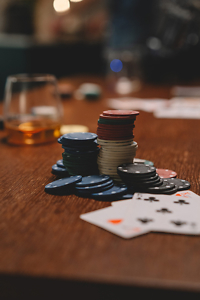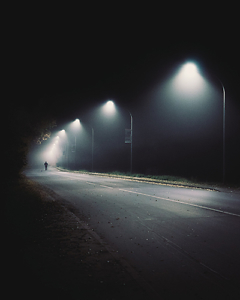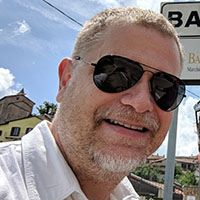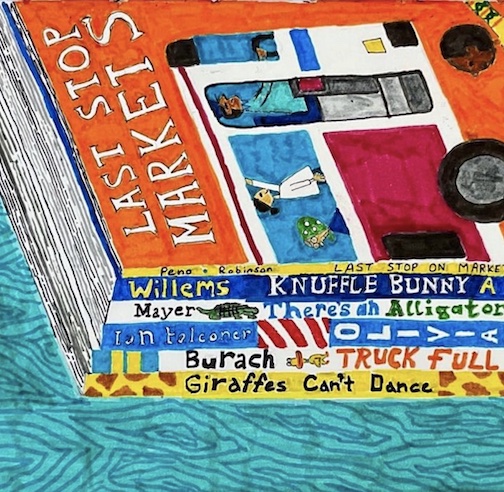The Sucker
You can learn a lot from a poker game
I was 18 and about to be the first Vargo to leave Detroit for any reason other than war, thanks to a student loan, a Pell grant, and the gift of an academic probation program that gave kids like me one semester to prove our scholarly worth or go back to wherever it was we came from.
 I had a car, a job at the lumber yard, and an insurance company calendar hidden underneath the bottom drawer of my built-in dresser, along with the pint bottle of Kessler’s I kept filled with whatever I could scrounge. On the calendar, I marked each square since graduation with a red squeaky X as the days passed. Xs were pushing across August like a Pac-Man swallowing numbered boxes, chased by ghosts, just like the video game. Every day the Xs got closer to box 27, marked LEAVE.
I had a car, a job at the lumber yard, and an insurance company calendar hidden underneath the bottom drawer of my built-in dresser, along with the pint bottle of Kessler’s I kept filled with whatever I could scrounge. On the calendar, I marked each square since graduation with a red squeaky X as the days passed. Xs were pushing across August like a Pac-Man swallowing numbered boxes, chased by ghosts, just like the video game. Every day the Xs got closer to box 27, marked LEAVE.
In my world there were two kinds of people: those broken souls who traded their dreams for color TV and their Tuesday night bowling league and survivors who replaced whatever dreams they had with shady side hustles and quiet cash deals made in school parking lots through the rolled-down windows of rusted-out muscle cars. I wanted nothing to do with either.
While I was out at night looking for trouble and waiting for August to end, Mom spent her nights rocking on the porch, reading The Detroit News and listening to Ernie Harwell and Al Kaline call the Tigers games on WJR. On nights I was out late drinking myself stupid or angry, she’d wait for me by the big kitchen window at the front of the house, eating saltine crackers in warm milk, then scurrying away to bed when she saw me stumbling up the driveway.
She’d birthed seven kids in 11 years. Nine years after the last of those, I came around. The toxemia my presence inside her caused put us in a hospital bed for three months before I was born and ruined her teeth — even in utero I took everything she would give. Like the stoic Midwesterner she was, she got dentures that she kept in a plastic cup at the kitchen sink and started raising me without missing a beat.
The summer I before I left for college, Dad was already in his 70s and retired. His body still showed the shadows of lean, muscular arms and broad shoulders that come from the lifetime of crushing labor awaiting any man with an 8th grade education and a family to support. He spent his days in our one-car garage behind the house making things from lumber he’d scavenge. There he could get away from Mom and have some time and space to himself. It also gave us a place to spend time together.
He’d tell stories about the regrets of his youth and the importance of dreams. Dad talked about dreams with the look a sailor gets sitting in a lifeboat he never thought he’d use and could barely find when it was time to watch his ship sink to the bottom of the sea. As I got older, the handful of stories he constantly returned to went from tales of caution and courage to an endless loop of lessons I no longer needed to hear, a burden on my time.
One afternoon a few days before I was done Xing my calendar, Dad coaxed me to the garage to help him split 2x6s on the table saw. When we were done, he pushed his taped-together glasses to the top of his nose, brushed away the sawdust sticking to his sweaty gray work shirt, and asked me what I had planned for that night.
“I’m playing poker,” I said.
“Where?”
“Denny’s house.”
“Who with?”
“Denny and Phil and somebody else.”

I said I didn’t know who else, but I did. It was one of the Grobowski brothers, and Dad really didn’t need to know that. Denny’s dad was a cop, so saying I was going to his house was code for safe. Sure, kids might get picked on and tortured, bruised and beaten, but there’d be no knives and no real fights in a cop’s basement. Every kid in the neighborhood was more than a little afraid of Detroit cops, whether they were somebody’s dad or not.
Denny was 20, stocky, and street smart with a cowlick so severe you’d have thought he pulled a fistful of Elmer’s glue through the front of his hair with four of his fat fingers. He worked construction and lived in his parents’ basement at his mother’s insistence. Phil graduated from high school with Denny. He slept in the same room he slept in as an infant, at some point having traded a crib for a big boy bed. He was sickly skinny with a narrow-pointed nose, thin red curly hair, a narrow mouth pointed downward on one side and a lisp that kept a secret whether he was saying “th” or “s.” Grobowski was a bit older than Phil and Denny and not as smart as either of them.
Dad asked if I’d ever played cards with these guys before. No, I said.
“Ever played poker before, son?”
I said nothing, but we both knew the answer.
He looked at me for a long time, then went about his business arranging the 2x6s we had split into neat stacks. Pushing his glasses back up his nose, he said, “Son, just remember, if you’re in a poker game and you don’t know who the sucker is, it’s you.”
I’d never heard that before. It sounded like something he’d learned along the way and kept stored in his memory, just for me and just for right now. I kept silent, trying to figure out what it meant.
“You may not understand now, son,” he said, “but you will soon enough.”
When we finished, I went to my room and stuffed four $20 bills in my pocket, drove to the bank, and changed them for quarters, dimes, nickels, and some dollar bills.
It started to rain on my way to Denny’s. I knocked on the back door. His sister Lisa was in the kitchen and hollered for me to come in. Lisa was tall, exotic, and always tan in the summer. So much so, it made me wonder how she and Denny could be born to the same parents. She was in cosmetology school and wore short shorts, hoop earrings, and a tiny ring on each of her tan middle toes. A couple of years earlier, at her 16th birthday party, she’d asked me for a birthday kiss. Surprised and scared, I had pretended not to hear her.

She told me Denny was in the basement, waiting for me. I smiled walking down the stairs, knowing she knew I was in this game.
As the wooden steps creaked under me, the laughing from the basement stopped. Their basement was like ours, musty with exposed pipes of all sorts tucked between the joists of the low ceiling, a cast iron pole in the middle holding up the rest of the house. I was the last to arrive.
Throughout the night, all the guys laughed at my jokes, even Grobowski. Denny made 7&7s at their tiny basement bar from a handle of Seagram’s. Wait until everybody hears about this shit, I said to no one but myself. They explained each game to me and how to play it: Blind Man’s Baseball, Blind Man’s Dime Store, Old Soldier’s Game, Straight and Stud Poker, and so on. They pointed out when I made mistakes in dealing and didn’t get mad.
It was almost two o’clock when Denny called the last hand. The Seagram’s bottle was empty, and I was left with four crinkled dollar bills and a hangover in utero. The three of them were still sitting at the card table smoking when I walked back up the wooden steps and out the door, tripping over the tail of a jackass I’d finally realized I had tucked between my legs.
The night sky had just cleared after the long steady rain. The wetness in the air gave the night sounds clarity and softened the constant smell of the city. I knew I’d never come back once I left. I’d never see Denny, Phil, or Grobowski again. Walking drunk through each circle of light the streetlights cut from the darkness, the chrome bumpers of parked cars showed themselves as shiny thin smiles toward the house where Mom sat in the dark at the big kitchen window, eating saltine crackers in warm milk.

Copyright (c) 2021 by Lou Vargo. All rights reserved. Lou Vargo was born and raised in Detroit. He came to Nashville from Texas in 2003. He lives in East Nashville with his wife, daughter, stepdaughter, dog, and cat.


